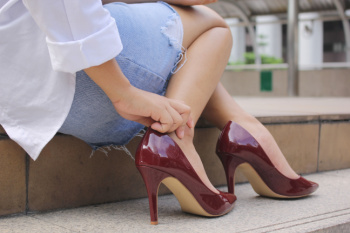
Choosing the right pair of high heels involves more than just style, it is about finding a fit that complements your unique foot shape. For flat feet, look for heels with built-in arch support or cushioning to provide stability and prevent discomfort. High arches benefit from heels with a lower height and extra cushioning to alleviate pressure on the instep. If you have narrow feet, opt for pointy-toed heels that offer a snug fit and elongate the appearance of the foot. Conversely, individuals with wider feet may find comfort in rounded or peep-toe styles that provide ample room in the toe box. Additionally, those with bunions or other foot irregularities may prefer heels with soft, stretchy materials or adjustable straps to accommodate any protrusions or sensitivities. Wearing heels can negatively affect the feet, and it is beneficial to choose the right shape and style for your feet. If you have developed foot conditions from wearing heels, it is suggested that you consult a podiatrist who can offer appropriate treatment, and guide you on choosing the right pair for you.
High heels have a history of causing foot and ankle problems. If you have any concerns about your feet or ankles, contact Barbara J. Aung, DPM from Aung Foot Health Clinic . Our doctor can provide the care you need to keep you pain-free and on your feet.
Effects of High Heels on the Feet
High heels are popular shoes among women because of their many styles and societal appeal. Despite this, high heels can still cause many health problems if worn too frequently.
Which Parts of My Body Will Be Affected by High Heels?
- Ankle Joints
- Achilles Tendon – May shorten and stiffen with prolonged wear
- Balls of the Feet
- Knees – Heels cause the knees to bend constantly, creating stress on them
- Back – They decrease the spine’s ability to absorb shock, which may lead to back pain. The vertebrae of the lower back may compress.
What Kinds of Foot Problems Can Develop from Wearing High Heels?
- Corns
- Calluses
- Hammertoe
- Bunions
- Morton’s Neuroma
- Plantar Fasciitis
How Can I Still Wear High Heels and Maintain Foot Health?
If you want to wear high heeled shoes, make sure that you are not wearing them every day, as this will help prevent long term physical problems. Try wearing thicker heels as opposed to stilettos to distribute weight more evenly across the feet. Always make sure you are wearing the proper shoes for the right occasion, such as sneakers for exercising. If you walk to work, try carrying your heels with you and changing into them once you arrive at work. Adding inserts to your heels can help cushion your feet and absorb shock. Full foot inserts or metatarsal pads are available.
If you have any questions please feel free to contact our office located in Tuscon, AZ . We offer the newest diagnostic and treatment technologies for all your foot and ankle needs.





